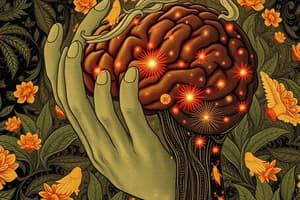Podcast
Questions and Answers
What is the primary function of memory encoding?
What is the primary function of memory encoding?
- Deleting unwanted memories
- Retrieving information from storage
- Converting sensory input into a usable form (correct)
- Storing information for a long time
Which type of memory has the shortest duration?
Which type of memory has the shortest duration?
- Sensory memory (correct)
- Implicit memory
- Long-term memory
- Short-term memory
What is the process by which short-term memories are converted into long-term memories called?
What is the process by which short-term memories are converted into long-term memories called?
- Encoding
- Retrieval
- Forgetting
- Consolidation (correct)
Which of the following is an example of recall?
Which of the following is an example of recall?
What type of long-term memory involves the conscious recall of facts and events?
What type of long-term memory involves the conscious recall of facts and events?
Which of the following is an example of implicit memory?
Which of the following is an example of implicit memory?
What is it called when old information hinders the recall of new information?
What is it called when old information hinders the recall of new information?
According to the forgetting curve, when is memory loss most rapid?
According to the forgetting curve, when is memory loss most rapid?
Which of the following factors is essential for encoding information into memory?
Which of the following factors is essential for encoding information into memory?
How does sleep affect memory consolidation?
How does sleep affect memory consolidation?
What is a mnemonic?
What is a mnemonic?
What is distributed practice, which is more effective than cramming, also known as?
What is distributed practice, which is more effective than cramming, also known as?
Which technique involves making connections between new information and existing knowledge?
Which technique involves making connections between new information and existing knowledge?
What is anterograde amnesia?
What is anterograde amnesia?
Which disease is the most common cause of dementia?
Which disease is the most common cause of dementia?
What is Korsakoff's syndrome typically caused by?
What is Korsakoff's syndrome typically caused by?
What part of the brain does chronic stress impair in particular?
What part of the brain does chronic stress impair in particular?
If someone is shown a picture and then asked to pick the original photo out of a set, what kind of memory retrieval is primarily being tested?
If someone is shown a picture and then asked to pick the original photo out of a set, what kind of memory retrieval is primarily being tested?
What is the capacity of short-term memory?
What is the capacity of short-term memory?
What type of memory is iconic memory?
What type of memory is iconic memory?
Flashcards
What is Memory?
What is Memory?
The cognitive process of encoding, storing, retaining, and retrieving information, essential for learning and adapting.
What is Memory Encoding?
What is Memory Encoding?
The initial stage where sensory input is converted into a form the brain can understand.
What is Elaborative Encoding?
What is Elaborative Encoding?
Making connections between new information and existing knowledge to improve memory.
What is Memory Storage?
What is Memory Storage?
Signup and view all the flashcards
What is Sensory Memory?
What is Sensory Memory?
Signup and view all the flashcards
What is Short-Term Memory?
What is Short-Term Memory?
Signup and view all the flashcards
What is Long-Term Memory?
What is Long-Term Memory?
Signup and view all the flashcards
What is Memory Consolidation?
What is Memory Consolidation?
Signup and view all the flashcards
What is Memory Retrieval?
What is Memory Retrieval?
Signup and view all the flashcards
What is Recall?
What is Recall?
Signup and view all the flashcards
What is Recognition?
What is Recognition?
Signup and view all the flashcards
What is Explicit Memory?
What is Explicit Memory?
Signup and view all the flashcards
What is Implicit Memory?
What is Implicit Memory?
Signup and view all the flashcards
What is Forgetting?
What is Forgetting?
Signup and view all the flashcards
What is Encoding Failure?
What is Encoding Failure?
Signup and view all the flashcards
What is Storage Decay?
What is Storage Decay?
Signup and view all the flashcards
What is Retrieval Failure?
What is Retrieval Failure?
Signup and view all the flashcards
What is Proactive Interference?
What is Proactive Interference?
Signup and view all the flashcards
What is Retroactive Interference?
What is Retroactive Interference?
Signup and view all the flashcards
What are Mnemonics?
What are Mnemonics?
Signup and view all the flashcards
Study Notes
- Memory is the cognitive process of encoding, storing, retaining and retrieving information
- It is essential for learning and adapting to the environment
Memory Encoding
- Encoding is the initial processing of information so that it can be stored
- It is the first step in creating a memory
- Encoding involves converting sensory input into a form that the brain can understand and use
- This can be visual, acoustic, or semantic
- Different encoding strategies can affect how well information is remembered
- Elaborative encoding, which involves making connections between new information and existing knowledge, tends to lead to better memory than rote memorization
Memory Storage
- Storage is the retention of encoded information over time
- It involves maintaining information in the brain for later use
- There are several types of memory storage:
- Sensory memory: Briefly holds sensory information
- It has a very large capacity but a very short duration (less than a few seconds)
- Short-term memory: Briefly holds information that is currently being used or attended to
- It has a limited capacity (about 7 items) and a short duration (about 20 seconds)
- Long-term memory: Stores information for a long time
- It has a virtually unlimited capacity and can store information indefinitely
- Sensory memory: Briefly holds sensory information
- Memory consolidation is the process by which short-term memories are transferred into long-term memories
- This process is thought to involve the hippocampus and other brain structures
Memory Retrieval
- Retrieval is the process of accessing stored information
- It is the final step in memory
- Retrieval can be affected by a variety of factors, such as:
- The way the information was encoded
- The context in which the information is being retrieved
- The presence of retrieval cues
- There are two main types of retrieval:
- Recall: Retrieving information without any cues
- Example: answering an open-ended question on a test
- Recognition: Identifying information that has been previously learned when it is presented again
- Example: answering a multiple-choice question on a test
- Recall: Retrieving information without any cues
Types of Memory
- Sensory memory:
- Initial stage of memory
- Briefly holds sensory information
- Includes iconic memory (visual) and echoic memory (auditory)
- Large capacity, but very short duration (milliseconds to seconds)
- Short-term memory (STM):
- Also known as working memory
- Limited capacity (7 +/- 2 items)
- Brief storage (seconds to minutes)
- Involved in conscious processing and manipulation of information
- Long-term memory (LTM):
- Relatively permanent and limitless storage of information
- Includes explicit (declarative) and implicit (non-declarative) memory
- Explicit memory (declarative):
- Conscious recall of facts and events
- Includes semantic memory (general knowledge) and episodic memory (personal experiences)
- Implicit memory (non-declarative):
- Unconscious recall of skills and habits
- Includes procedural memory (motor skills), priming (enhanced identification of objects or words), and classical conditioning (learned associations)
Forgetting
- Forgetting is the inability to retrieve information that has been stored in memory
- There are several reasons why forgetting can occur:
- Encoding failure: Information was never properly encoded in the first place
- Storage decay: Memories fade over time if they are not used
- Retrieval failure: Information is stored in memory, but cannot be accessed
- Interference: Other information interferes with the retrieval of the target information
- Proactive interference occurs when old information interferes with the retrieval of new information
- Retroactive interference occurs when new information interferes with the retrieval of old information
- Motivated forgetting: People may intentionally try to forget unpleasant or traumatic memories
- The forgetting curve, discovered by Hermann Ebbinghaus, shows that memory loss is most rapid shortly after learning, and then levels off over time
Factors Affecting Memory
- Attention: Attention is necessary for encoding information into memory
- Divided attention can impair memory performance
- Emotion: Emotional events tend to be better remembered than neutral events
- This is because emotional events trigger the release of hormones that enhance memory consolidation
- Stress: Chronic stress can impair memory function, especially in the hippocampus
- Sleep: Sleep is important for memory consolidation
- Sleep deprivation can impair memory performance
- Age: Memory function declines with age
- This is due to a variety of factors, such as changes in brain structure and function
Memory Improvement Techniques
- Mnemonics: Memory aids that use imagery, organization, or other techniques to improve encoding and retrieval
- Examples include acronyms, acrostics, and the method of loci
- Spacing effect: Distributed practice (studying over a longer period of time) is more effective than massed practice (cramming)
- Testing effect: Testing yourself on material is more effective than simply rereading it
- Elaborative rehearsal: Making connections between new information and existing knowledge
- Organization: Organizing information into meaningful categories or hierarchies
- Paying attention: Focusing on the information that you want to remember
- Getting enough sleep: Sleep is important for memory consolidation
- Reducing stress: Chronic stress can impair memory function
Memory Disorders
- Amnesia: Loss of memory due to brain damage or trauma
- Anterograde amnesia is the inability to form new memories
- Retrograde amnesia is the loss of memories from the past
- Alzheimer's disease: A progressive neurodegenerative disease that causes memory loss and cognitive decline
- It is the most common cause of dementia
- Korsakoff's syndrome: A chronic memory disorder caused by thiamine deficiency
- It is often associated with chronic alcoholism
- Traumatic brain injury (TBI): Brain damage caused by a blow or jolt to the head
- TBI can cause a variety of memory problems, depending on the severity and location of the injury
Studying That Suits You
Use AI to generate personalized quizzes and flashcards to suit your learning preferences.




